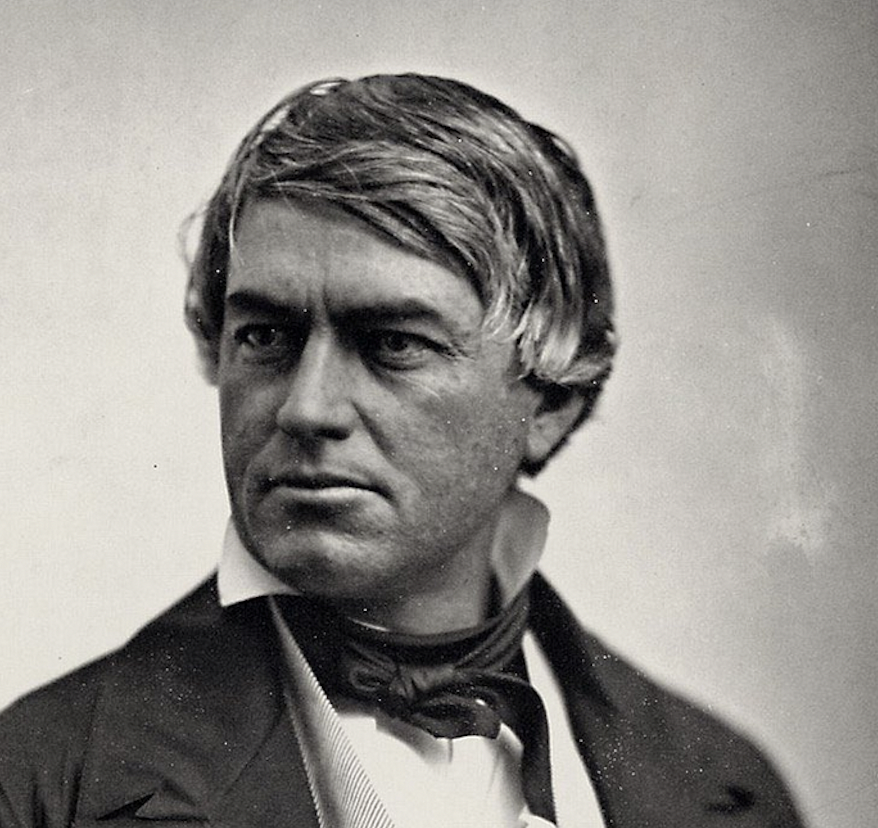By Lynn Burnett
In 1810, Cassius Marcellus Clay was born into one of the wealthiest slave-owning families in Kentucky. However, while studying at Yale, he heard the radical abolitionist William Lloyd Garrison speak. It was a powerful experience that seriously challenged the beliefs Cassius was raised with, and set him on the path to embracing abolition.
This prominent son of wealthy slave owners later served three terms in the Kentucky House of Representatives, where his anti-slavery views led to attacks and assassination attempts. The stories of Cassius Clay fighting off assailants sound like the stuff of legend. During a heated public debate, for example, a hired killer fired a bullet into Cassius’ chest… just as Cassius was unsheathing his bowie knife, which took the hit and saved his life. Despite having just taken the impact of a bullet, Cassius tossed the would-be assassin over an embankment… after slicing off his nose and one of his ears. When six men wielding knives and clubs attacked Cassius at a public meeting, he was stabbed in the back… but was still able to end the fight by gutting one of them and causing the rest to flee.
In 1845, Cassius Clay began publishing an anti-slavery newspaper called True American. He installed armored doors at the printing press, as well as two cannons. It didn’t stop a mob of 60 men from storming the press, and forcing the publication to relocate to a free state (even as Cassius himself remained in Kentucky.)
A decade and a half later, Cassius Clay would organize the defense unit that protected the White House when the Civil War erupted. He served as minister to Russia during the war, where he helped to secure Russia’s support for the Union. When President Lincoln recalled him from Russia in 1862 to serve as a general in the Union Army, Cassius publicly refused the position unless the President issued a proclamation freeing all slaves under Confederate control… which Lincoln did later that same year.
However: it must be said that, like most White people who opposed slavery, during his career Cassius Clay called for the gradual, rather than the immediate end to slavery. And as Ta-Nehisi Coates writes, “Even as Clay freed those people whom he personally held enslaved on his estate [at a loss of $50,000 to himself, in 1860 dollars], he ‘retained in slavery a number of Negroes who were attached to the estate without being his personal property.’” Furthermore, much of the reason why Cassius wanted to end slavery was because he worried that it drove down wages for White people. After the Civil War, he did not align himself with the Radical Republicans, who called for greater systemic overhauls that would have created a more equitable society for formerly enslaved people. Cassius Clay is, in other words, an example of the messiness of White antiracist history: someone who was willing to put his body on the line and make economic sacrifices for the cause… but who was also far from perfect. When we look at this history, it’s important to look at it warts and all.
Nine years after Cassius Clay’s death in 1903, a man named Herman Heaton Clay – whose ancestors had been enslaved by the Clay family – named his son after the knife-wielding abolitionist. The Cassius Clay born in 1912 would later name HIS son Cassius Clay, Jr. – better known to the world as Muhammad Ali.
Additional Resources
Ta-Nehisi Coates: Bob Costas To Muhammad Ali—”Well Actually…”
Arica L. Coleman: What’s in a Name: Meet the Original Cassius Clay.
Lowell H. Harrison: The Anti-Slavery Career of Cassius M. Clay.
Michael Medved: Americans Should Know the Story of Abolitionist Cassius Clay: Muhammad Ali’s namesake risked his career, wealth and life to promote emancipation.
New York Times: Long Before Muhammad Ali, Another Cassius Clay Was Larger Than Life.
Wikipedia entry.
